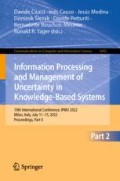Abstract
When a group of agents is faced with collective decisional tasks, the agents may have to cooperate to establish which alternative appears to be a convenient consensus. The influence an agent may have upon the other ones may change the collective decision. Modelling of influence in a social network assumes that each player has an initial inclination for one of the alternative that may be different from his final decision. The point of departure of such studies is the concept of the Hoede-Bakker index, which computes the overall decisional power of a player in a social network when the decision is binary. We propose to extend the notions of decision power and influence indices when the decision is not simply binary, but associated with a scale of success: an individual can more or less adhere to the collective decision. Initially, the idea was motivated by the collective evaluation process in sensory analysis. Indeed, sensory analysis is a set of methods for measuring sensory perceptions. When the panel is made up of trained individuals who master the vocabulary of the domain, sensory analysis has been the subject of numerous evaluation protocols. On the other hand, when the evaluators are inexperienced evaluators not mastering the descriptors, the sensory characterization may strongly be impacted by influential panelists. In this paper, we are interested in measuring such a qualitative influence. Framing our work in game theory models, we propose to extend the notion of influence index to the qualitative process of graded decision in sensory analysis, justifying our choices on the basis of our feedback on the process of sensory analysis by a collective of panelists.
Access this chapter
Tax calculation will be finalised at checkout
Purchases are for personal use only
Notes
- 1.
[Constraint] = 1 if Constraint is true else 0.
References
Jaubert, J.-N., Tapiero, C., Dore, J.C.: The field of odors: toward a universal language for odor relationships. Perfum. Flavorist 20(3), 1–16 (1995)
Noble, A.C., Arnold, R., Masuda, B.M., Pecore, S., Schmidt, J., Stern, P.: Progress towards a standardized system of wine aroma terminology. Am. J. Enol. Vitic. 35(2), 107–109 (1984)
Johnson, K.E., Mervis, C.B.: Effects of varying levels of expertise on the basic level of categorization. J. Exp. Psychol. Gen. 126(3), 248 (1997)
Grabisch, M., Rusinowska, A.: Measuring influence in command games. Soc. Choice Welfare 33, 177–209 (2009)
Hoede, C., Bakker, R.: A theory of decisional power. J. Math. Sociol. 8, 309–322 (1982)
Rusinowska, A., de Swart, H.: Generalizing and modifying the Hoede-Bakker index. In: de Swart, H., Orłowska, E., Schmidt, G., Roubens, M. (eds.) Theory and Applications of Relational Structures as Knowledge Instruments II. Lecture Notes in Computer Science(), vol. 4342. Springer, Heidelberg (2006). https://doi.org/10.1007/11964810_4
Grabisch, M., Rusinowska, A.: A model of influence in a social network. Theor. Decis. 69, 69–96 (2010)
Grabisch, M., Rusinowska, A.: Influence in Social Networks, COGnitive Systems with Interactive Sensors (COGIS2009). France, Paris (2009)
Harispe, S., Ranwez, S., Janaqi, S., Montmain, J.: Semantic similarity from natural language and ontology analysis. In: Synthesis Lectures on Human Language Technologies, 254 p. Morgan & Claypool Publishers (2015)
Sanchez, D., Batet, M.: Semantic similarity estimation in the biomedical domain: an ontology-based information-theoretic perspective. J. Biomed. Inform. 44(5), 749–759 (2011)
Resnik, P.: Using information content to evaluate semantic similarity in a taxonomy. In: Proceedings of IJCAI-95, Montréal, Canada (1995)
Harispe, S., Sanchez, D., Ranwez, S., Janaqi, S., Montmain, J.: A framework for unifying ontology-based semantic similarity measures: a study in the biomedical domain. J. of Biomed. Inform. 48, 38–53 (2014)
Harispe, S., Montmain, J., Medjkoune, M.: Summarizing conceptual descriptions using knowledge representations. In: IEEE Symposium Series on Computational Intelligence for Human-like Intelligence, (SSCI), Athens, Greece (2016)
Author information
Authors and Affiliations
Corresponding author
Editor information
Editors and Affiliations
Rights and permissions
Copyright information
© 2022 Springer Nature Switzerland AG
About this paper
Cite this paper
Montmain, J., Imoussaten, A., Harispe, S., Jean, PA. (2022). On the Notion of Influence in Sensory Analysis. In: Ciucci, D., et al. Information Processing and Management of Uncertainty in Knowledge-Based Systems. IPMU 2022. Communications in Computer and Information Science, vol 1602. Springer, Cham. https://doi.org/10.1007/978-3-031-08974-9_15
Download citation
DOI: https://doi.org/10.1007/978-3-031-08974-9_15
Published:
Publisher Name: Springer, Cham
Print ISBN: 978-3-031-08973-2
Online ISBN: 978-3-031-08974-9
eBook Packages: Computer ScienceComputer Science (R0)

